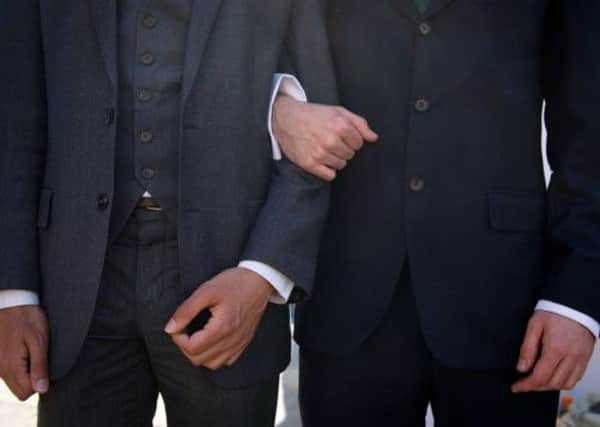Michael Kelly: Little charity shown to religious


Not that any discrimination has taken place. No same-sex couple has been turned away for adoption for the simple reason that no homosexual couple has sought to make use of the society’s services. Sensibly, such couples recognise the society’s adherence to the traditional Catholic principles of marriage and seek advice from the many other organisations happy to deal with their inquiries. This is a hypothetical case arising from a complaint, not from the gay lobby, but from secularists pursing an agenda to remove any vestiges of religious belief from public life.
Does the raising of children by same-sex couples produce equal outcomes for the children as the traditional heterosexual environment is a question that has long been claimed as being settled in favour of those who see no distinction between the two. Tim Hopkins, of the Equality Network, who this week agreed that the interests of children must come first, went on to argue that “research evidence shows clearly that children do as well with same-sex parents as they do with mixed-sex parents”. He might like to update his reading. Recent work by social scientists, such as American Mark Regnerus, throws doubt on this conclusion.
Advertisement
Hide AdAdvertisement
Hide AdWhen the Scottish Government, in its desperation to demonstrate its political correctness, brought the issue of same-sex adoption prematurely to parliament, it did so in the face of determined public opposition. The government’s consultation on the issue had produced an 89 per cent majority against same-sex adoption. But as with same-sex “marriage”, Mr Salmond pressed on.
Many MSPs expressed misgivings, but many ignored the theoretical and ideal comparison made between gay couples and happily married heterosexuals. Instead, they rightly compared the plight of children stuck in care homes to the more gentle environment that any kind of family provides and voted to pass the legislation. However, many –especially Catholics – sought and were given assurances by the government on the fate of St Margaret’s. They are angry and disturbed that the society is under attack not through the Holyrood legislation but by the charity regulator, who works to the Equality Act under the principles of the European Convention of Human Rights (EHRC).
The intention of those Holyrood dissidents has been thwarted by this conflict of laws which the Scottish Government failed to resolve before the legislation completed its passage in Edinburgh. In fact, the SNP group rejected an opportunity to protect the role of faith-based agencies when it threw out an amendment by Michael McMahon that would have ensured such protection.
In its judgment against St Margaret’s, OSCR, in rejecting the freedom of religion exemption assumed to be guaranteed under ECHR, concluded that “whilst the religious exception may apply where organisations are conducting activities such as acts of worship or devotion, it is unlikely that it will apply where a religious organisation is providing services to the public or carrying out functions of a public nature. In terms of the relevant case law, religious belief by itself cannot justify discrimination on grounds of sexual orientation when an organisation is providing a public-facing service, such as the provision of a voluntary adoption agency, which is the charity’s function in terms of adoption law.”
This is a devastating blow against the practice of religion. As Father Tom White of St Margaret’s puts it: “According to this interpretation, we can tell our beads but cannot tell our people.” Adherence to religious principles through the provision of public service is now illegal. Yet Catholicism, foremost among all Christian sects, emphasises the equality of practice with faith. As the catechism teaches, faith without good works is insufficient. The law is opposing that fundamental tenet. It is not even the secular movement that so disturbs White. It is the humanist, atheistic, anti-religious element that is driving the agenda.
St Margaret’s is appealing OSCR’s decision to the Scottish Charities Appeals Tribunal. It regards it as not only wrong, but also mean in its interpretation of the right to religious freedom allegedly guaranteed under EHRC. According to White, whose background is in Canon Law, when an exemption is granted the legal convention is to treat it generously. Those exempted should not have to fight to prove a legal right conferred on them.
This might be an argument more acceptable to the Court of Session, to which a further appeal, if necessary, will be made. In the recent case, under different legislation, of the Catholic midwives objecting to participating in any part of the abortion process, that court did apply the widest possible interpretation to the meaning of “process”. It is likely to follow its own precedent.
If, however, it is up to the Green Party, the case will never get that far. Its politicians have condemned the society for considering “wasting” charitable funds on such legal pursuits. Open access to the law stops short of those who wish to defend their religious principles.
Advertisement
Hide AdAdvertisement
Hide AdOn the narrow case of St Margaret’s, one would hope that OCSR’s case would be summarily dismissed. Its conclusion that St Margaret’s discriminated against gays is based on the fact that the society requires all clients to be married for at least two years. If Alex Salmond has his way, everyone but the family pet will be allowed to get “married” and the alleged discrimination will disappear.
As far as the general assault on the practice and promotion of religious principles through public service is concerned, it is immaterial whether this is a result of a humanist conspiracy, as some allege, or simply an agglomeration of unintended consequences of badly thought-through laws. The fact is there is now a hierarchy of rights, with religious belief at the bottom of the pile.